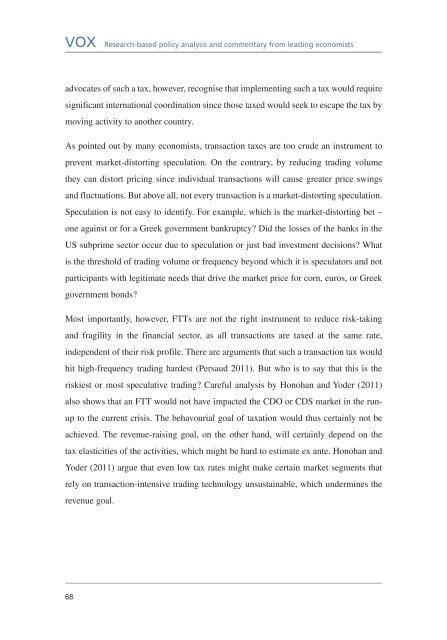You also want an ePaper? Increase the reach of your titles
YUMPU automatically turns print PDFs into web optimized ePapers that Google loves.
VOX Research-based policy analysis and commentary from leading economists<br />
advocates of such a tax, however, recognise that implementing such a tax would require<br />
significant international coordination since those taxed would seek to escape the tax <strong>by</strong><br />
moving activity to another country.<br />
As pointed out <strong>by</strong> many economists, transaction taxes are too crude an instrument to<br />
prevent market-distorting speculation. On the contrary, <strong>by</strong> reducing trading volume<br />
they can distort pricing since individual transactions will cause greater price swings<br />
and fluctuations. But above all, not every transaction is a market-distorting speculation.<br />
Speculation is not easy to identify. For example, which is the market-distorting bet –<br />
one against or for a Greek government bankruptcy? Did the losses of the banks in the<br />
US subprime sector occur due to speculation or just bad investment decisions? What<br />
is the threshold of trading volume or frequency beyond which it is speculators and not<br />
participants with legitimate needs that drive the market price for corn, euros, or Greek<br />
government bonds?<br />
Most importantly, however, FTTs are not the right instrument to reduce risk-taking<br />
and fragility in the financial sector, as all transactions are taxed at the same rate,<br />
independent of their risk profile. There are arguments that such a transaction tax would<br />
hit high-frequency trading hardest (Persaud 2011). But who is to say that this is the<br />
riskiest or most speculative trading? Careful analysis <strong>by</strong> Honohan and Yoder (2011)<br />
also shows that an FTT would not have impacted the CDO or CDS market in the runup<br />
to the current crisis. The behavourial goal of taxation would thus certainly not be<br />
achieved. The revenue-raising goal, on the other hand, will certainly depend on the<br />
tax elasticities of the activities, which might be hard to estimate ex ante. Honohan and<br />
Yoder (2011) argue that even low tax rates might make certain market segments that<br />
rely on transaction-intensive trading technology unsustainable, which undermines the<br />
revenue goal.<br />
68














